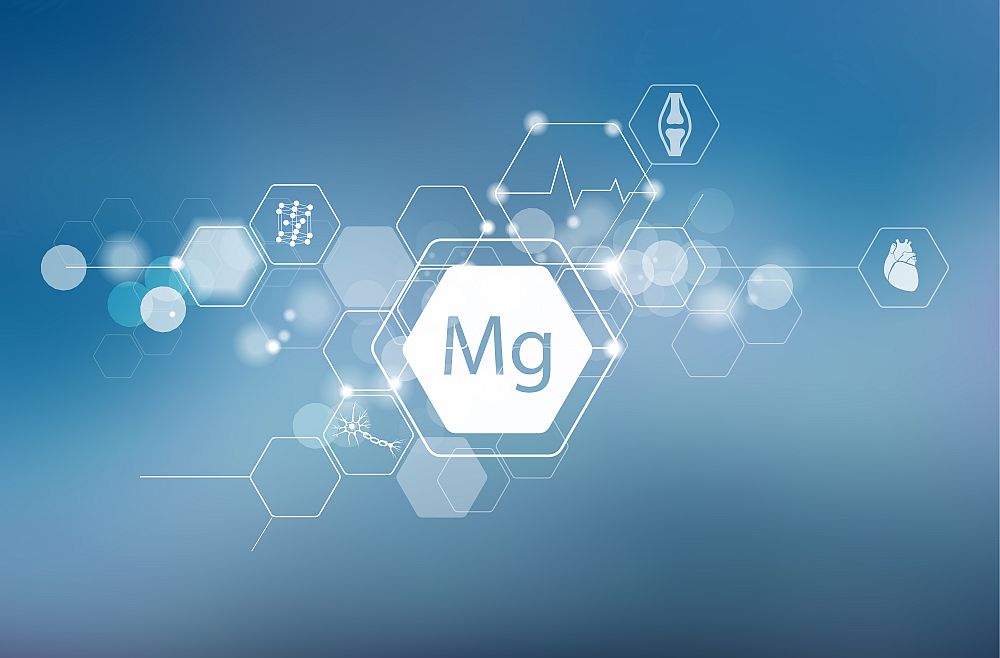Magnesium is an essential mineral for the body, which makes possible the good simultaneous functioning of over 300 vital processes for the body.
What are magnesium dietary supplements?
There are several types of magnesium: sulphate, chloride, glycine, citrate, marine, oxide, carbonate, lactat, malat, tarat, orate, aspartate. Existing food supplements can contain any of these types of magnesium, simple or in combination with other minerals or vitamins, such as: magnesium, magnesium and zinc, liquid magnesium, magnesium and calcium.
Supplements can be in the form of capsules, tablets, liquids or powder. They are chosen according to the needs of the body. For example, Magnesium B6 has the following benefits: it contributes to maintaining mental health, normal functioning of the nervous system, decreased stress and anxiety. Supplements should be administered according to needs, at the indication of the specialist doctor.
Properties and benefits of magnesium in the body
Magnesium is an essential mineral for the body, which makes possible the good simultaneous functioning of over 300 vital processes for the body. The body of an adult contains 25g of magnesium, more than half of this amount being found in the bones, and the rest in the soft tissues.
Magnesium has many benefits, including: metabolism of glucose and carbohydrates, improves slow intestinal transit, contributes to the health of the bone system, helps to absorb calcium in the body, to the proper functioning of the muscular system (prevents the appearance of cramps).
It is effective in case of fatigue, stress, duties of the heart. Magnesium sulphate is used to treat chronic fatigue syndrome. It can prevent the occurrence of migraines, anxious states, and even preeclampsia in pregnancy.
The vital role of magnesium in the health of the nervous system
Magnesium supports the good functioning of the nervous system. Improves mood, can prevent depression, help get a quiet sleep, contribute to the role of neural synapses. Prevents and combats migraines because it influences neurotransmitters in the brain.
Magnesium in supporting muscle performance
Magnesium is a mineral that controls the transmission of impulses from nerves to muscle, which leads to muscle relaxation. It acts with calcium, which is responsible for muscle contraction. In the case of a magnesium deficiency, calcium is stored in excess muscles, which leads to painful muscle cramps.
Lack of magnesium in the body. Symptoms and indications
The effects given by the lack of magnesium in the body occur "in silence", which can lead to the installation of conditions just before the symptoms are felt. Pay attention to: irritability, anxiety, pronounced fatigue, insomnia, difficulty concentration, low appetite, presence of cramps or sensation of trembling muscles, irregular or accelerated heartbeat, hypoglycemia.
How to integrate natural magnesium supplements into your routine
Magnesium can be administered at any time of the day, before or after a main meal. If you suffer from insomnia, you can take magnesium B6 before bedtime. Likewise, it is advisable to be given in the evening in the case of people suffering from muscle cramps. Keep in mind that magnesium has a slight relaxation effect, so do not administer it in the moments of the day you want to be very active.
The daily dose also recommend sources from which you can get it
The daily dose of magnesium depends on age, sex, pregnancy or breastfeeding. Between 0 months and 13 years, both sexes need the same quantity, as follows: 0-6 months (30 mg), 7-12 months (75 mg), 1-3 years (80 mg), 4-8 years (130 mg), 9-13 years (240 mg).
Between 14-18 years, girls need 360 mg, and boys 410 mg.
At 19-30, women - 310 mg, men - 400 mg. Starting with 31 years, women - 320 mg, men - 420 mg.
In pregnancy and breastfeeding, the daily dose of magnesium is between 310-400 mg, depending on the age and recommendations of the specialist doctor.
Magnesium can be obtained from foods such as: nuts and seeds, mushrooms, oats, beans, spinach, soy milk, potatoes, avocado, banana, salmon.
Useful questions:
What is magnesium and why is it important to the body?
Magnesium is an essential mineral, fourth as abundance in the human body. Magnesium enters the structure of hundreds of enzymes that intervene in carbohydrate, lipid and protidic metabolism. It is important because it is involved in over 300 metabolic processes that support the proper functioning of the body.
What are the benefits of natural magnesium supplements?
Magnesium helps maintain normal heart rate, is involved in energy metabolism, protein synthesis and DNA production, preventing diabetes by regulating insulin secretion, plays an important role in maintaining normal functioning of the nervous system. It increases effort resistance, it can prevent heart attack, stroke or osteoarthritis.
Are there side effects of natural magnesium supplements?
The side effects of magnesium administration may occur in the case of people who take concomitantly diuretics, antibiotics or medication for heart disease. The doctor should be consulted in the case of people suffering from kidney disease. Magnesium supplements can cause nausea, cramps, diarrhea. Magnesium overdose is manifested by: diarrhea, nausea, vomiting, muscle weakness, lethargy, low blood pressure, breathing problems.




